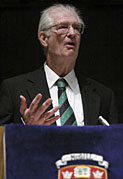The illth of nations
Herman Daly is as mild-mannered a revolutionary as you're likely to find.
 Economist Herman Daly
Economist Herman DalyPhoto: Andrew Dobrowolskyj |
|
In his March 27 Beatty Lecture, "Uneconomic Growth and the Illth of Nations: Defining the Optimal Scale of the Macro Economy," the eminent University of Maryland ecological economist virtually flayed mainstream neoclassical economics for its myopic promise of infinite growth, and called for an overhaul of economic theory and practice. In the nicest way possible.
His lecture, the second in a two-part series honouring the 40th anniversary of Rachel Carson's essential environmental manifesto Silent Spring, came without a whit of vitriol, delivered in the unthreatening voice of a kindly uncle. But standard economics did get a talking-to.
Daly explained that his ecological sect of economics seeks to optimize three critical variables: allocation of resources, distribution of wealth and sustainability of scale. "Standard, neoclassical economists -- and if there are any in the audience, I hope they will have the chance to set me straight after the lecture -- focus primarily on the issue of efficient allocation of resources and secondarily on just distribution of wealth," said the former economist for the World Bank. "The notion of scale isn't even on their radar."
Scale is an important point of departure, Daly argued, because the economy does not grow in a vacuum. It is a subset of the larger ecosystem which is finite, materially closed and governed by the laws of thermodynamics. When the economy expands, it further encroaches on the ecosystem.
This is inevitable, he continued, because the economy, like humans and all their products, is dissipative; if left to itself, it tends to fall apart ("Those of us over 50 will identify with this," he quipped). The only thing keeping the dissipative structure organized, at least in the short run, is a constant metabolic flow, a throughput of low-entropy matter and energy from the environment that is used to maintain structure and then expelled as high-entropy matter and energy back into the environment. "We cannot avoid producing 'bads' along with goods," Daly said. "If we stop depleting, we die of starvation. If we stop polluting, we die of constipation. So the question is: how do we keep this necessary throughput, this metabolic flow, within the natural capacity of the ecosystem to absorb our waste and reconstitute them in usable forms, and to regenerate resources that we can use again? We need to find a level of throughput that is sustainable given its dependence on the rest of the ecosystem."
No one knows exactly what this level is. But only ecological economists, Daly argued, are even looking for this optimal scale of economy, beyond which expansion will increase environmental and social costs more than it increases production benefits. This overreaching state he called "uneconomic growth" which leads to increasing "illth," a term coined by Victorian Age social critic John Ruskin to define economic and social activities that led to no social good. In Daly's lexicon, the Bizarro World word depicts the particular social "bad" of environmental pollution and depletion.
Beyond scale, Daly explained that ecological economics also takes an expanded view of distribution, especially intergenerational distribution of wealth, over time, and interspecies distribution, namely biodiversity. "These two elements of distribution have not been really considered very much in standard economics," he charged. "Furthermore, as scale increases and vital natural resources become scarcer, we have to allocate them using market mechanisms. If we are going to bring water and air into the calculus of economics, we better make sure that distribution of resulting wealth is fair -- or at least a whole lot fairer than it is today. Or else we will price a whole lot of people into the grave."
Daly closed with a parable of theoretical economies to demonstrate the real-world shortfall of standard neoclassical economics. The first economy is at a small enough scale that air and water are plentiful and free to all. The second economy has three times the population and per-capita resource use; air and water have become scarce and are sold at an efficient price. Different worlds, but equally optimal allocation of resources. "The neoclassical economist is equally satisfied with both cases: prices are right and resources are allocated efficiently," Daly said. "But is everybody else happy? Is everybody else indifferent about the two scales? I don't think so.
"There are many other considerations not captured in pricing. These considerations derive from the other two problems: distribution and scale. Standard, neoclassical economics strains out the gnats of allocative inefficiency while swallowing the twin camels of unjust distribution and unsustainable scale. The concept of uneconomic growth, accumulating illth and unsustainable scale have to be incorporated into our economic thinking if it is to be capable of expressing what is really happening in the world."

